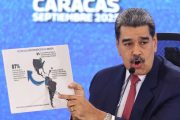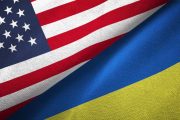Following President-elect Donald Trump’s acceptance of a congratulatory phone call on December 2 from Tsai Ing-wen (shown, right), the president of the Republic of China (ROC, popularly known as Taiwan) the communist government of the mainland People’s Republic of China (PRC) issued a formal complaint about Trump’s action.
On December 3, the People’s Republic’s foreign ministry spokesman Geng Shuang issued a statement asserting that “there is only one China in the world.”
“We have noticed relevant reports and lodged solemn representation with the relevant side in the United States,” Shuang’s statement read.
“I must point out that there is only one China in the world and Taiwan is an inseparable part of the Chinese territory…. The ‘one China’ principle is the political foundation of China-U.S. relations.
“We urge the relevant side in the U.S. to adhere to the ‘one China’ policy, abide by the pledges in the three joint China-US communiques, and handle issues related to Taiwan carefully and properly to avoid causing unnecessary interference to the overall China-U.S. relationship,” continued Shuang’s statement.
A report in The Hill noted that the conversation between Trump and Tsai was the first between a U.S. president or president-elect with any leader of Taiwan since 1979, when the United States ended diplomatic relations with the Republic of China (ROC) in accordance with U.S. acceptance of the one-China policy. That policy requires countries to either recognize diplomatically the People’s Republic of China, on the mainland, or the Republic of China, on Taiwan, but not both. The Chinese Communist Party views Taiwan as a breakaway province following the communist takeover under Mao Tse-tung, after which the nationalist government under Chiang Kai-shek retreated to the island of Formosa, now commonly known as Taiwan.
There are currently 22 nations that maintain diplomatic relations with the ROC:
Africa (three states): Burkina Faso, São Tomé and Príncipe, Swaziland
Europe (one state): Holy See
Oceania (six states): Kiribati, Marshall Islands, Nauru, Palau, Solomon Islands, Tuvalu
Central and South America and the Caribbean (12 states): Belize, Dominican Republic, El Salvador, Guatemala, Haiti, Honduras, Nicaragua, Panama, Paraguay, Saint Kitts and Nevis, Saint Lucia, Saint Vincent and the Grenadines
In response to those parties who voiced criticism of his contact with Tsai, Trump tweeted on December 2: “The President of Taiwan CALLED ME today to wish me congratulations on winning the Presidency. Thank you!” “Interesting how the U.S. sells Taiwan billions of dollars of military equipment but I should not accept a congratulatory call.”
Among those who criticized his taking of the call was Bonnie Glaser, senior advisor for Asia at the Center for Strategic and International Studies in Washington, who said: “President-elect Trump is just shooting from the hip, trying to take phone calls of congratulatory messages from leaders around the world without consideration for the implications.”
Jared Rizzi, a White House correspondent for POTUS @SiriusXM 124, quoted a statement from an unnamed White House spokesman who said: “Some of the progress we’ve made with our relationship with China could be undermined” by Donald Trump’s Taiwan call.
White House Press Secretary Josh Earnest, during his daily briefing on December 5, was also critical of Trump’s action: “It’s unclear exactly what the strategic effort is, what the aim of the strategic effort is, and it’s unclear exactly what potential benefit could be experienced by the United States, China or Taiwan, but I’ll leave that to them to explain.”
Trump’s act also received praise from some political leaders. Speaking on Fox News’ Fox & Friends on December 5, Representative Dana Rohrabacher (R-Calif.) said that the president-elect’s phone call with Taiwan’s president was “terrific” because of the diplomatic warning it sent to China.
“He showed the dictators in Beijing that he’s not a pushover,” said Rohrabacher. “These people, you’ve got to remember, China has had an enormously aggressive foreign policy and by him actually going to Taiwan, he’s showing the people in Beijing that they cannot have this aggressive foreign policy and expect to be treated just the same by an American president.”
Trump’s contact with Tsai also received a favorable response from CNN’s Fareed Zakaria, who had been a strong critic of Trump during the recent presidential campaign. This supportive statement is all the more significant given that Zakaria is well positioned among the American foreign policy establishment, since he serves on the board of the internationalist Council on Foreign Relations (CFR), and is a former managing editor of Foreign Affairs, the CFR’s journal. Speaking with CNN’s Alisyn Camerota and Chris Cuomo on the New Day program, Zakaria said that phone conversation between Trump and Tsai was “not a bad idea.”
“The truth of the matter is we need leverage with China. China is a country that cooperates with the United States on many issues, but on many issues we need to be able to push them harder,” he said. Zakaria warned, however, that any U.S. relationship with Taiwan needs to be part of a broader, long-term approach in the region.“The key here is that it should be part of a thought-through strategy,” Zakaria said.
In a video posted on YouTube, Infowars host Alex Jones praised Trump’s contact with the president of Taiwan and slammed the communist regime ruling mainland China, correctly reminding his listening that the Chinese communists have murdered millions of their own people over the years:
The same corporate media that openly takes orders from communist China is now criticizing our president elect Donald J. Trump for daring to simply talk to the newly elected first woman president of Taiwan when she called him to congratulate him.
They’re saying that its an unwritten policy since 1979 that U.S. presidents don’t talk to Taiwanese presidents — even though we’ve had a defense treaty since 1949 with them that we signed with Chaing Kai-shek who was kicked out of China by the Communist Chinese.
Who is illegitimate [are] the Communist Chinese that have killed 80-plus million of their own people and keep them in slave conditions and have had suicide nets … and mobile execution vans and [who] execute hundreds of thousands of Falun Gong every year and sell their organs on the global market.
That’s who’s lecturing us that we can’t talk to a president, all because Jimmy Carter signed a deal to sell us out to them in 1979.
Jones did a good job of squeezing a lot of background information about the history of the communist takeover of China following World War II and the expulsion of the nationalist Chinese government of Chiang Kai-shek in 1949 into a brief 12-minute video. He noted how the U.S. betrayal of Chiang led to his downfall and also summarized the piecemeal shift in U.S. policy from one that supported the nationalists to one that eventually acquiesced to the communists.
Of course, none of this is news to long-time readers of The New American, which has published several articles over the years exploring these events in great detail. Among these was a 2001 article that traced how U.S. concessions to communist rulers were responsible for the eventual downfall of the nationalist government of China. The article noted how during the closing days of World War II, President Roosevelt conceded the Japanese-controlled Chinese province of Manchuria to Soviet dictator Stalin. Following Japan’s surrender, the Soviets turned over vast stores of arms that the Japanese had left in Manchuria to the communist rebels in China led by Mao Tse-tung.
But this was only half of the story of how the United States helped the communist effort to gain control of China. As the article continues:
But there were other significant steps along the way that insured Chiang’s defeat and the loss of China. Those steps included the cease-fires forced upon Chiang when he was making military progress, our insistence that Chiang form a coalition government with the Communists, and our 10-month embargo on the sale or shipment of arms to Chiang. When the embargo was fastened upon Chiang, General George Marshall boasted: “As Chief of Staff I armed 39 anti-Communist divisions; now with a stroke of the pen I disarm them.”
For some time after the nationalists under Chiang fled to Formosa (Taiwan), they enjoyed a modicum of respect and support from the United States and other Western nations. The nationalist government continued to be regarded as the legitimate government of all of China and held a permanent seat on the UN Security Council (along with its veto power) since China was a founding member of the UN.
That changed, however, when United Nations General Assembly Resolution 2758, passed on October 25, 1971, recognized the People’s Republic of China (PRC) as “the only legitimate representative of China to the United Nations” and expelled “the representatives of Chiang Kai-shek from the place which they unlawfully occupy at the United Nations.”
The 2001 article from The New American noted significant changes in U.S. policy towards China the following year:
After the fall of the mainland, the People’s Republic of China was officially shunned by Washington. But that abruptly changed in 1972 when Republican President Richard Nixon made his pilgrimage to China, setting the stage for Democratic President Jimmy Carter’s termination of diplomatic relations with Taiwan on the last day of 1978 and the establishment of diplomatic relations with the PRC on the first day of 1979. From that date on, the U.S. has recognized only the Communist government as legitimate, but undoubtedly no American president has put this betrayal in as explicit terms as Bill Clinton, who stated on last year’s China trip: “[W]e don’t support independence for Taiwan, or ‘two Chinas,’ or ‘one Taiwan, one China,’ and we don’t believe Taiwan should be a member in any organization for which statehood is a requirement.”
After Carter’s termination of diplomatic relations with Taiwan, the island nation (some would say the legitimate government of all of China, based on Taiwan) became a diplomatic non-entity, as far as official U.S. policy was concerned. This, despite the fact the United States has still honored its 1949 defense treaty signed with the government of Chiang Kai-shek and, as Trump noted, the United States sells Taiwan “billions of dollars of military equipment.”
While speaking on the phone for a few minutes with the president of Taiwan might be regarded as a relatively insignificant action, by so doing, Trump has accorded the ROC government a courtesy that no American leader has extended to it since Carter treated the Taiwanese as outcasts. This simple action evidently greatly troubles both the communists in China and their apologists in the West. Anti-communists will hope to see more of the same after Trump takes office in January.
Photo: AP Images
Related articles:
After Intercepting U.S. Reconnaissance Plane, China Issues Demand
U.S.-China War “Inevitable” If U.S. Continues Flights Over Claimed Islands




